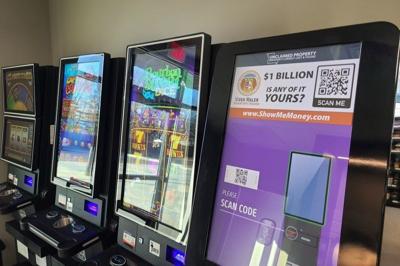JEFFERSON CITY ŌĆö After a decadelong deluge of video gaming machines flooding Missouri gas stations, bars and restaurants, some Republican lawmakers say they will tackle the pernicious problem this year.
Legislation filed in the Senate and a similar measure introduced in the House would regulate and tax the now ubiquitous slot machines that have spread unabated across the state via companies like Wildwood-based Torch Electronics.
Freshman Sen. Brad Hudson, R-Cape Fair, is sponsoring one of the bills. He understands that the odds are less than favorable.
ŌĆ£IŌĆÖm not going to pretend that this is not going to be a heavy lift,ŌĆØ Hudson said.
People are also reading…
HudsonŌĆÖs proposal would establish a fee and tax structure to help the Missouri Lottery administer a regulated video gaming program that would generate tax revenue. There also would be safeguards in place to limit play of the games by minors.
ŌĆ£WeŌĆÖve got kind of a ŌĆśWild WestŌĆÖ situation,ŌĆØ Hudson said. ŌĆ£IŌĆÖve seen them increasing in numbers. IŌĆÖve heard of kids playing the machines.ŌĆØ
Along with HudsonŌĆÖs plan, Rep. Bill Hardwick, R-Dixon, will present his plan to regulate the games in the House during a hearing Monday. Sen. Karla May, D-├█č┐┤½├Į, also is sponsoring a legalization effort.
ŌĆ£We would create a regulatory structure of what is legal and what is illegal,ŌĆØ Hardwick said. ŌĆ£That would give business owners regulatory certainty that they are operating in a space that has been defined.ŌĆØ
Although previous attempts to formally legalize the machines have fizzled, the latest push comes as the dynamics surrounding the controversial topic have changed.
For years the issue of legalizing slot machines has been tied to sports betting, but voters in November gave narrow approval to a plan to legalize wagering on teams like the ├█č┐┤½├Į Cardinals and Kansas City Chiefs, taking that possible roadblock off the table.
In addition, Missouri has a new governor ŌĆö Republican Mike Kehoe ŌĆö who may bring a new approach to the spread of the machines. The partisan count in the GOP-controlled Senate remains the same at 24-10, but the personnel in the often-temperamental chamber also has changed.
Illinois companies want in
Backing the effort are Illinois-based video gambling companies, who want a system similar to what the Land of Lincoln has in place.
Illinois has 48,000 licensed video slot machines in more than 8,600 businesses. The Illinois Gaming Board said the program generated more than $1 billion in tax revenues for state and local government last year.
The Illinois companies have amped up their political contributions in an attempt to bring reluctant lawmakers on board with the expansion.
During the 2024 election season, for example, Effingham, Ill.-based J&J Ventures poured nearly $851,000 into the campaign coffers of Missouri candidates.
Andy Arnold, who represents J&J, said the company wonŌĆÖt operate in Missouri until a law is in place.
ŌĆ£Operating unregulated games is tantamount to operating illegal gambling, and a reason you can lose your license in a legal state. So, because Missouri is an unregulated market, J&J and others will not operate here,ŌĆØ Arnold said.
But many of the same roadblocks that have doomed previous efforts remain.
Torch Electronics, for example, has opposed legalization efforts and has also spread campaign contributions to candidates, including Kehoe, whose political action committee received a $250,000 check in October.
The company, with the help of powerful lobbyist Steve Tilley, has killed legislative attempts to crack down on the devices. Bills over the years have sought to remove any ambiguity about the legality of the machines.
Torch did not respond to a request for comment. The company has argued in multiple lawsuits that its machines are legal amusement devices even though players can win money from them.
Legalizing the terminals also is opposed by the stateŌĆÖs 13 casinos, which do not want to lose a share of their business to companies that donŌĆÖt have to undergo the strict background vetting process in place for casino operators.
ŌĆ£Missouri Gaming Association will continue to oppose bills such as those filed by Senator Hudson and will be presenting information at hearings when they are scheduled,ŌĆØ the casino lobbying group said in an email.
Local control
With virtually no guidance from the GOP-controlled state, some municipalities are taking the issue into their own hands.
In February, the Springfield City Council voted to ban the proliferation of slot machines amid concerns about crime.
That led to a lawsuit by Torch accusing the city of unlawfully seizing nine of the companyŌĆÖs devices from businesses across the city.
As in other cases involving Torch, the longer the case stretches out in court, the longer the company continues to operate with few strings attached.
It is unclear if Missourians have an appetite for more gambling in the state.
The sports betting question on the ballot in November garnered a razor-thin 50.05% of the vote, despite a $43 million campaign to get it legalized.
At the same time, voters turned down a proposal to create a new casino at the Lake of the Ozarks.
Hudson said he doesnŌĆÖt believe his proposal represents an expansion because the machines are already in the state.
ŌĆ£Something needs to be done,ŌĆØ he said. ŌĆ£We need to get a handle on this.ŌĆØ
The legislation is .
Missouri House members questioned and criticized Treasurer Vivek Malek. His office has placed advertisements on Torch Electronics Gambling machines, which are unregulated and illegal. He testified before a subcommittee on Tuesday, Feb. 27, 2024. Video provided by the House communications office; edited by Beth O'Malley

















